Do You Know a Couple Months Before Your Death That You Will Die
What if we knew when and how we'd die?
(Prototype credit:
Getty Images
)
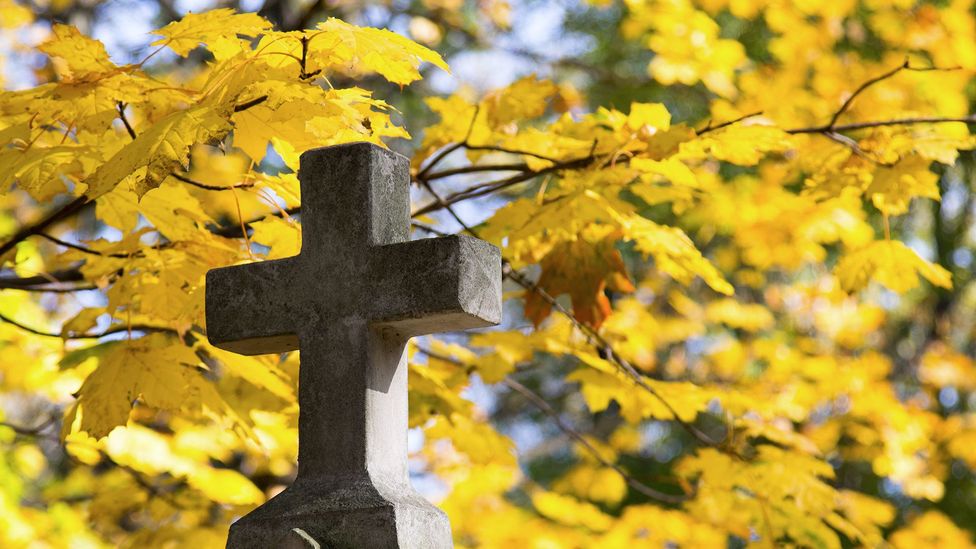
Even a 42.8 millisecond wink of the word "death" across a computer screen is enough to make us human activity differently – and not always for the better.
Y
Y'all and everyone you've ever known will someday die. According to some psychologists, this uncomfortable truth constantly lurks in the back of our minds and ultimately drives everything we practice, from choosing to attend church, consume vegetables and go to the gym to motivating us to have children, write books and create companies.
For healthy people, death usually lurks in the back of our minds, exerting its influence on a hidden level. "Most of the time, we get through our days unaware, not thinking of our bloodshed," says Chris Feudtner, a pediatrician and ethicist at the Children's Hospital of Philadelphia and the Academy of Pennsylvania. "We cope by focusing on the things more directly in front of us."
What would happen, though, if the ambiguity surrounding our ain demise were taken away? What if we all suddenly were told the exact date and means of our deaths? While this is, of course, impossible, conscientious consideration of this hypothetical scenario tin can shed light on our motivations as individuals and societies – and hint at how to best spend our limited time on this Earth.
Y'all might also like:
• The woman who forced us to look death in the face
• Facebook is a growing and unstoppable digital graveyard
• The macabre fate of 'chirapsia middle corpses'
First, let's plant what we know virtually how expiry shapes behaviour in the existent world. In the 1980s, psychologists became interested in how we deal with the potentially overwhelming anxiety and dread that come up with the realisation that we are goose egg more than than "breathing, defecating, self-conscious pieces of meat that can die at any time", as Sheldon Solomon, a psychology professor at New York's Skidmore College, puts information technology.

Some researchers believe that we hold onto certain behavior to stave off our fear of expiry (Credit: Getty Images)
Terror management theory, the term Solomon and his colleagues coined for their findings, posits that humans embrace culturally constructed beliefs – that the world has meaning, for case, and that our lives take value – in society to fend off what would otherwise exist paralysing existential terror.
In more than than 1,000 peer-reviewed experiments, researchers have institute that, when reminded that we are going to die, nosotros cling harder to foundational cultural behavior and strive to heave our sense of self-worth. We also become more defensive of our beliefs and react with hostility to anything that threatens them.
Fifty-fifty very subtle nods at mortality – a 42.viii millisecond flash of the word "death" across a reckoner screen, a chat that takes place inside sight of a funeral domicile – are enough to trigger behavioural changes.

Thoughts of death can lead usa to become more than patriotic, while also hardening our sympathies to outsiders (Credit: Getty Images)
We as well become more than nihilistic, drinking, smoking, shopping and eating in excess – and we are less concerned about caring for the environment.
Should everyone of a sudden learn the date and means of their demise, society could – and probable would – get more racist, xenophobic, tearing, state of war-mongering, self-harming and environmentally destructive than it already is.
This isn't pre-ordained, still. Researchers similar Solomon ultimately hope that, by becoming aware of the expansive negative effects that death anxiety triggers, we might be able to counteract them.
In fact, scientists take already recorded a few examples of people bucking these general trends.
Buddhist monks in South Korea, for example, exercise not respond this way to reminders of death.
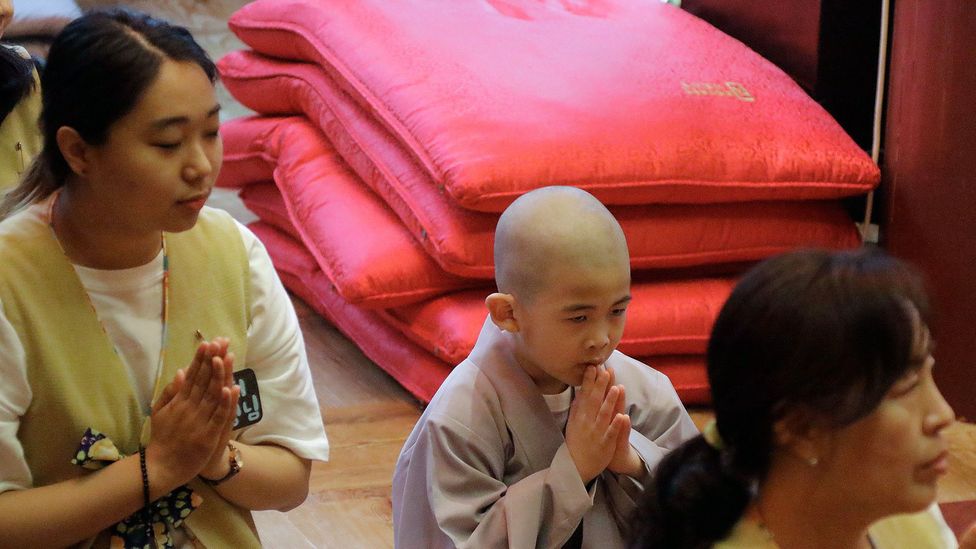
Buddhist monks practice not seem to have the typical self-defensive reactions to reminders of decease, bucking the predictions of 'terror management theory' (Credit: Getty Images)
Researchers looking into a fashion of thinking called "expiry reflection" also have found that request people to think not merely about death in a full general, abstract way, simply to think about exactly how they will dice and what touch their decease will have on their families, elicits very different reactions.
In that case, people become more altruistic – willing, for example, to donate blood regardless of whether there is a high societal demand for it. They are likewise more open up to reflecting on the roles of both positive and negative events in shaping their lives.
Given these findings, learning our death appointment may lead us to focus more on life goals and social bonds rather than responding with knee-jerk insularity.
This would especially be true "if we promote strategies that assist us to take expiry as part of life and integrate this cognition into our daily choices and behavior," says Eva Jonas, a psychology professor at the University of Salzburg. "Knowing most the scarcity of life may increase the perception of life'southward value and develop the sense that 'nosotros're all in the same gunkhole', promoting tolerance and pity and minimising defensive responses."

Reflecting on our own demise in a specific, explicit way can encourage altruistic behaviours similar giving blood (Credit: Getty Images)
Morbid personalities
Regardless of whether gild as a whole takes a nasty or nice plough, how we would react on an individual level to knowledge nearly our expiry would vary depending on personality and the specifics of the big event.
"The more neurotic and anxious you are, the more preoccupied you'll be with death and unable to focus on meaningful life changes," says Laura Blackie, an assistant professor of psychology at the University of Nottingham. "Simply on the other mitt, if you're told you'll die peacefully at 90 in your slumber, and then y'all might not exist that motivated to engage with it, either – like, 'Oh, that's fine, carry on.'"
Whether life ends at 13 or 113, though, studies of terminally ill individuals tin can shed light on typical responses to expiry.
Palliative care patients, Feudtner says, often experience two phases of thinking. First, they question the very premise of their diagnosis, request if expiry is definitely imminently inescapable or whether it is something they can fight.
Later on that, they contemplate how to brand the most of the fourth dimension they accept left. Almost autumn into one of two categories. They either decide to put their whole energy and focus into doing everything they can to beat the affliction, or they opt to reflect on their lives and spend as much time as possible with loved ones doing things that bring them happiness.
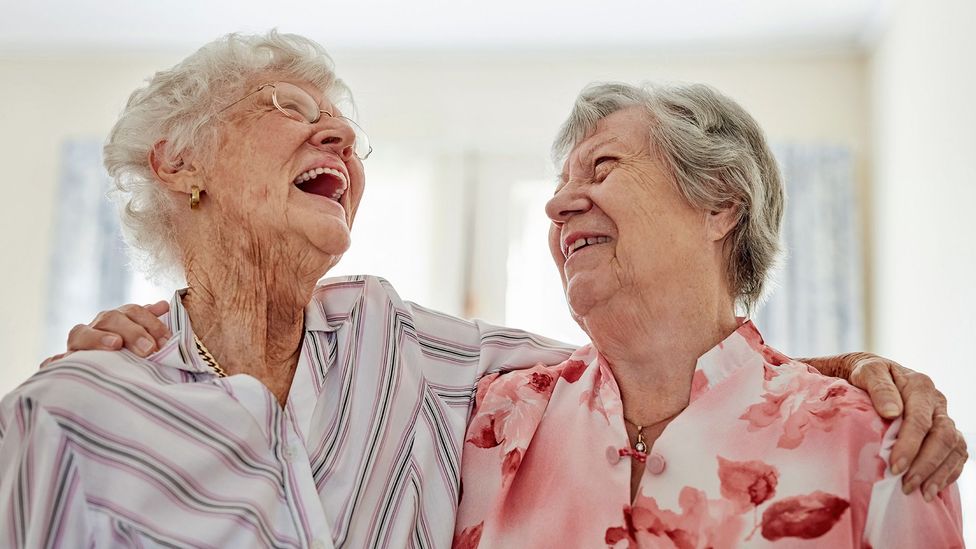
Some people would probably decide not to fight their expiry date, only spend time doing things that bring them joy (Credit: Getty Images)
The same processes would likely play out under the hypothetical death date scenario. "Even if yous know you have 60 more years, eventually that lifespan is going to exist measured in just a couple years, months and days," Feudtner says. "One time that clock winding downward becomes too close for comfort, I call back nosotros'd see people moving in these ii dissimilar directions."
Those who opt to try to thwart their deaths may get obsessed with fugitive it, peculiarly as time runs out. Someone who knows they are destined to drown might endlessly practice swimming then they can have a fighting run a risk at survival, for example, while someone who knows they volition dice in a traffic accident may cull to avoid vehicles at all costs.
Others, all the same, may go the opposite route – trying to cheat their predicted death by attempting to terminate their lives on their own terms. This would allow them, in a style, to gain command over the process. Jonas and her colleagues found, for example, that when they asked people to imagine that they will suffer a painful, irksome expiry from an illness, those who were given the choice of a cocky-adamant death – to cease their life in a way of their choosing – felt more in control and exhibited fewer defensive biases related to decease feet.
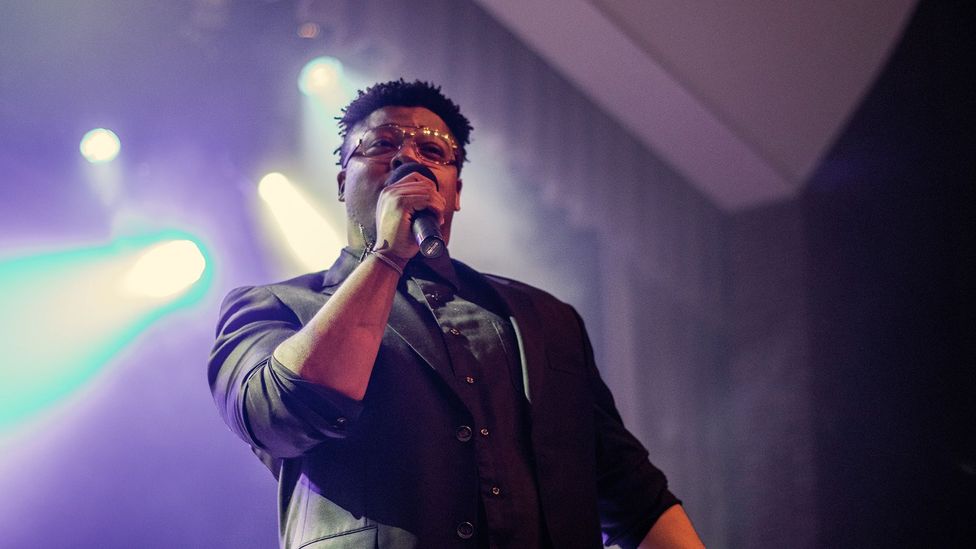
Some people might react past pushing themselves to greater creative heights (Credit: Nappy.co)
Those who get the route of accepting their death sentences may too react in a diverseness of means. Some would exist energised to brand the about of the time they have, rising to greater heights of creative, social, scientific and entrepreneurial achievement than otherwise would have been possible. "What I'd like to call back is that knowing our expiry date would bring out the best in us, that information technology would give us the psychological latitude to be able to exercise more than for ourselves and for our families and communities," Solomon says.
Indeed, there is promising evidence from trauma survivors that having a sense of the express time we have left can motivate self-improvement. While difficult to collect baseline data for such people, many insist that they take changed in profound, positive ways. "They say they are stronger, more spiritual, recognise more positive possibilities and capeesh life more than," Blackie says. "They come up to the realisation that, 'Wow, life is brusque, I'yard going to die one day, I should make the most of it.'"
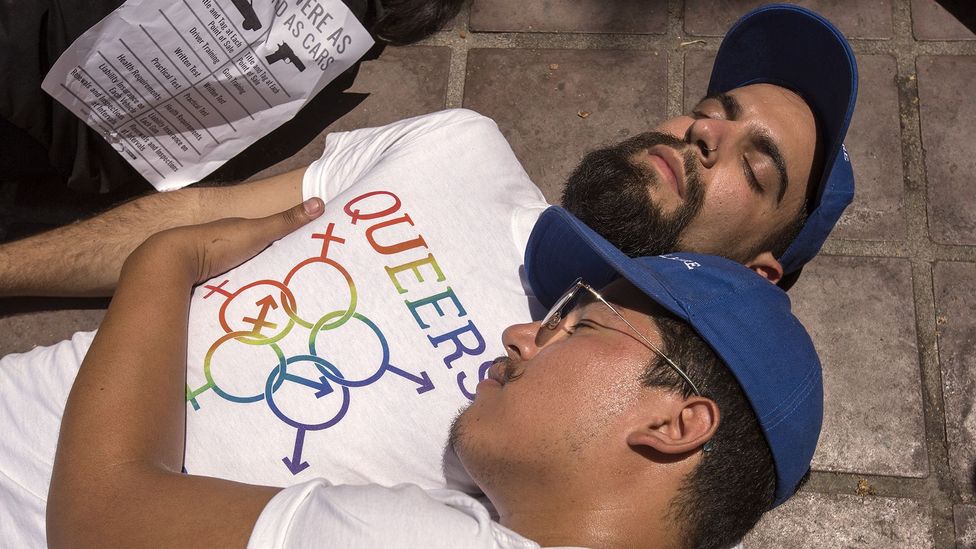
Survivors of traumatic events – such every bit the Orlando shooting – sometimes report greater resilience (Credit: Getty Images)
Not everyone would go their all-time selves, however. Instead, many people probably would cull to check out of life and terminate to contribute meaningfully to order – not necessarily because they are lazy, just considering they are overtaken by a feeling of pointlessness. As Caitlin Doughty, a mortician, author and founder of the Social club of the Good Decease, a death credence collective, puts it, "Would you be writing this column if y'all knew you were going to die next June?" (Probably not).
Feelings of pointlessness may also cause many people to surrender whatever semblance of a healthy lifestyle. If death is pre-ordained at a certain time no matter what, "I'1000 not going to bother to swallow organic nutrient anymore, I'm going to beverage regular Coke instead of Diet Coke, and maybe I'll try some drugs and shove Twinkies in my confront all day," Doughty says. "So much of our culture is designed around staving off death and maintaining law and lodge to proceed death away."

A recognition of our own mortality can, ironically, trigger nihilistic behaviours like smoking, drinking and overeating (Credit: Getty Images)
Most likely, though, the majority of individuals would toggle between beingness hyper-motivated and nihilistic, opting ane week to "sit at home and spray Cheez Whiz on crackers with a thirty-pack and watch another Police force and Society on Netflix" and the next "to go volunteer at the soup kitchen", Solomon says. Only regardless of where we fall on that spectrum, fifty-fifty the near enlightened amidst u.s.a. – peculiarly every bit we approached our death date – would occasionally become "a quivering ruin."
"Changes are stressful," Feudtner agrees. "Here we're talking nigh the biggest modify that happens to an private – from being to no longer being alive."
Religious disruption
Practically speaking, no matter where we lived in the globe, our day-to-day life would fundamentally change as a result of learning when and how we were due to die.
Many more than people might attend therapy, which would develop specialised death-related sub-fields. New social rituals and routines might emerge, with decease dates perhaps celebrated like birthdays, simply counted down instead of up.
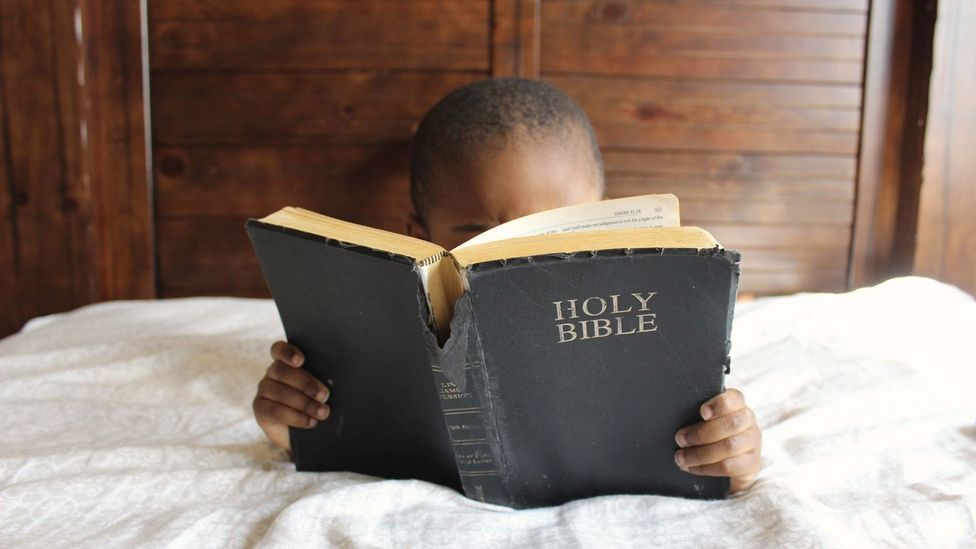
Religions would be shaken to the core (Credit: Nappy.co)
And existing religions would be shaken to the cadre. Cults could spring up in the spiritual wake left backside. "Do we get-go worshipping this system that tells us when we're going to die? Make offerings to the organisation? Give away our virginal daughters?" Doughty says. "Information technology would admittedly disrupt religious beliefs."
Relationships would nearly certainly be afflicted as well. Finding someone whose death appointment was close to one'south own would go a mandatory requirement for many, and dating apps designed to filter for those in ane'south cohort would brand that task easier. "Ane of the things that oftentimes makes people fear death the nearly – often more than their own death – is loss of those they dearest," Doughty says. "Why would I desire to stay with someone who is going to dice at 40 if I'yard going to die at 89?"
Similarly, if it were possible to determine a expiry engagement from a biological sample, some parents may decide to abort fetuses doomed to dice immature to avoid the pain of losing their child. Others – knowing that they themselves will non survive past a certain age – may opt to not have children at all, or else do the opposite, having as many children as quickly as possible.
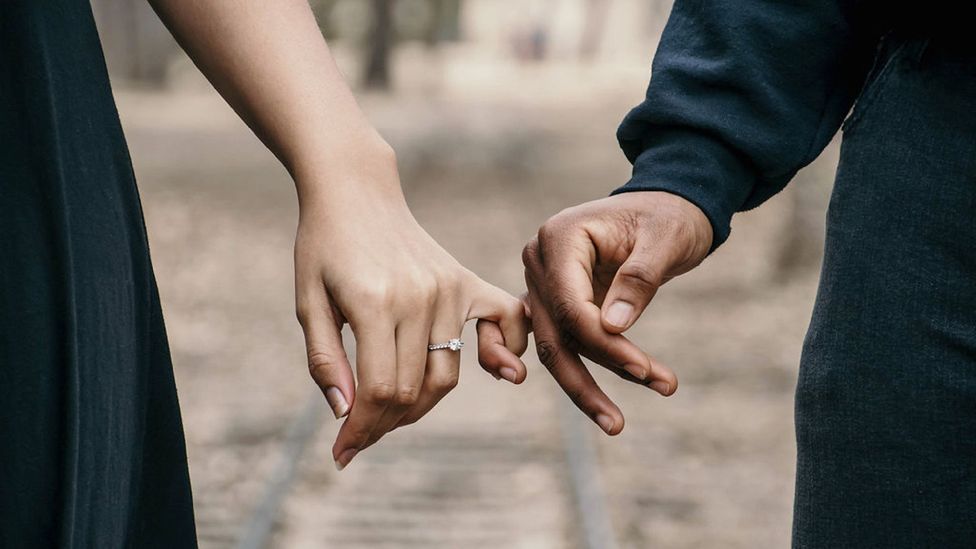
Many people probably would prioritise finding a romantic partner whose death appointment was shut to one's own (Credit: Nappy.co)
We would too have to grapple with new laws and norms. According to Rose Eveleth, creator and producer of the podcast Flash Forward (an episode of which explored a similar hypothetical death engagement scenario), legislation may be drafted around death date privacy to avoid employer and service-provider bigotry. Public figures, on the other hand, may be compelled to share their dates before running for function (or may cause a furore by refusing to practice and then). "If a presidential candidate is going to die three days into the presidency, that matters," Eveleth points out.
And even if not legally required, some individuals may choose to get their death dates tattooed on their arm, or clothing them on a military dog tag, and then that – in the case of an accident – emergency medical technicians volition know whether or non to bother trying to revive them, Eveleth says.
The funeral industry would be greatly impacted equally well: it would cater to the still-living rather than to their bereaved families. "Funeral homes would no longer be able to prey on people in their time of grief to get every bit much coin as possible," Eveleth says. "Information technology puts power in consumers' hands in a way that is adept."
On the large day itself, some people might throw carefully curated parties, as those choosing to undergo humane euthanasia are beginning to do in real life. Others, especially those who will die in a manner that could put people in impairment's way, may feel ethically or emotionally compelled to isolate themselves. However others, Eveleth says, may choose to utilize their decease for a higher artistic or personal purpose, taking part in a play in which everyone actually dies in the terminate or staging a literal die-in for a cause they believe in.
Should we come to learn the time and mode of our individual demises, our ways of life would be greatly changed.
"Man civilisation truly has adult effectually death and the idea of decease," Doughty says. "I call up this would completely undermine our system of life."
--
Correction: Chris Feudtner's affiliation was given incorrectly in a previous version of this story; it is the Academy of Pennsylvania. We regret the error.
Join 800,000+ Futurity fans by liking us on Facebook , or follow us on Twitter .
If you liked this story, sign upwardly for the weekly bbc.com features newsletter , called "If Y'all Only Read half dozen Things This Calendar week". A handpicked selection of stories from BBC Time to come, Culture, Capital, and Travel, delivered to your inbox every Friday.
Source: https://www.bbc.com/future/article/20180618-what-if-we-knew-when-we-were-going-to-die
0 Response to "Do You Know a Couple Months Before Your Death That You Will Die"
Post a Comment